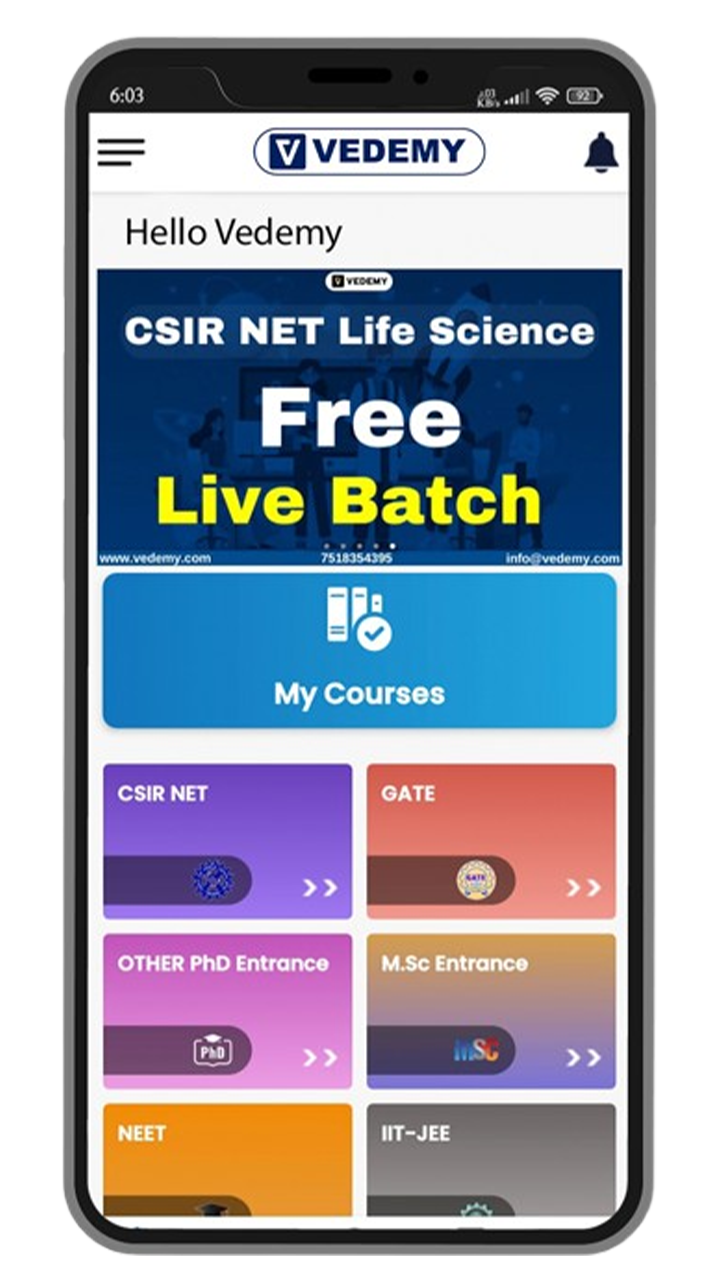Vedemy
189 days agoPhD Admissions 2025-26: Comprehensive Information on JNCASR, BRIC-inStem, CSIR-IGIB & NCBS-GS
1. JNCASR PhD Admissions 2025-26
Eligibility Criteria:
- A Master’s degree (MSc/MTech) in Physics, Chemistry, Biology, or related fields from a recognized institution.
- A minimum of 50–60% marks (exact cutoff can vary; relaxations apply for reserved categories).
- National-level fellowships (CSIR/UGC/ICMR/DBT) are strongly preferred if you wish to secure an institute fellowship seat.
- Final-year Master’s students can apply subject to completing their degree before the PhD session starts.
How to Apply:
- Online Application: Fill out the JNCASR admissions portal form (the institute may provide a dedicated platform).
- Application Documents: Be ready with academic transcripts, proof of fellowship (if any), statement of purpose, and references.
- Written Test/Shortlisting: Depending on the department, there may be a written screening test. Fellowship holders may be exempt from the written exam in some cases.
- Interview: Shortlisted candidates are called for interviews (in-person or online).
- Final Selection: Based on interviews, academic track record, and availability of fellowship seats.
Important Dates:
- Applications Open: Around March/April 2025
- Last Date to Apply: Likely May 2025
- Interview Schedule: June/July 2025
- Session Starts: August 2025
Program Details:
- Fellowship & Funding: Typically, institute or national fellowship ~₹31,000–35,000/month.
- Areas of Research: JNCASR offers research in interdisciplinary fields such as Materials Science, Theoretical Sciences, New Chemistry, Evolutionary & Integrative Biology, etc.
- Duration: Average 5 years, with coursework, a comprehensive exam, and thesis defense.
- On-Campus Facilities: Laboratories, housing (limited), library, etc.
- Selection Ratio: Highly competitive; strong academic record and clear research interests are crucial.
2. BRIC-inStem PhD Program (August 2025)
Eligibility Criteria:
- Master’s degree in Biology/related disciplines with at least 55–60% marks.
- A valid national fellowship (e.g., CSIR-JRF, UGC-JRF, DBT, ICMR) is mandatory. inStem does not provide a separate fellowship from core funding for this program.
- Those in the final year of Master’s may apply, provided they can activate their fellowship upon joining.
How to Apply:
- Online Application: Fill the BRIC-inStem application form within the announced window.
- Attach Documents: Academic marksheets, fellowship proof, statement of purpose, etc.
- Interview Process:
- Round 1 (Online): Short interview to assess basics and motivation.
- Round 2 (In-Person at Bangalore): Deeper evaluation of research aptitude and compatibility with inStem labs.
- Final Selection & Offer: Offers are made to successful candidates; they must confirm acceptance within ~10 days.
Important Dates:
- Application Period: March 2025 (closing ~end of March).
- Round 1 Interviews: April 2025 (online).
- Round 2 Interviews: May 2025 (in Bangalore).
- Program Start: August 1, 2025.
Program Details:
- Affiliation: The PhD degree is typically awarded through RCB (Regional Centre for Biotechnology), with the research carried out at inStem.
- Research Areas: Stem cell biology, regenerative medicine, cellular biology, chemical biology, computational biology, and more.
- Fellowship: Students must use their own external fellowship starting day one.
- Hostel Accommodation: Limited on-campus housing.
- Duration: ~5 years with milestones (proposal defense, annual reviews, thesis submission).
3. CSIR-IGIB PhD Program (August 2025)
Eligibility Criteria:
- Master’s degree (MSc/MTech) with at least 60% marks in any branch of life sciences, biotechnology, chemistry, physics, mathematics, or related fields.
- Must hold a valid Junior Research Fellowship (JRF) from CSIR, UGC, DBT, ICMR, or equivalent.
- Age limit ~28 years (relaxations apply); final-year Master’s students can apply conditionally.
How to Apply:
- AcSIR Registration: Register on the AcSIR portal (Academy of Scientific and Innovative Research) for the August 2025 session.
- IGIB Online Form: Fill the IGIB-specific form using the AcSIR Application Number, upload required documents (transcripts, fellowship proof), and pay the application fee if applicable.
- Shortlisting & Interview Call: Candidates meeting eligibility are invited for in-person interviews at IGIB, Delhi.
- Interview Process: Typically two rounds (broad panel, then deeper discussion). Focus on fundamentals, research aptitude, and the submitted research proposal.
- Final Selection: Based on interview performance. Offers sent via email and website announcement.
Important Dates:
- Applications Open: March 2025
- Application Deadline: Mid-April 2025
- Interviews: May 2025 (in Delhi)
- Joining & Session Start: August 2025
Program Details:
- Research Areas: Genomics, chemical & systems biology, bioinformatics, structural biology, functional biology, etc.
- Enrollment & Degree: Students register as AcSIR PhD scholars; the degree is awarded by AcSIR.
- Fellowship Stipend: Supported by the candidate’s own JRF; ~₹31,000/month + HRA (initially).
- Hostel: Limited; outstation candidates may get assistance.
- Duration: Typically 5 years, including coursework, proposal defense, annual reviews, and thesis defense.
4. NCBS-GS 2025 PhD Program
Eligibility Criteria:
- Educational Background: Master’s degree in any science discipline (biology, physics, chemistry, etc.) or a professional degree (MTech, MPharm, MBBS, etc.).
- National Exam Route: Must have a strong rank in CSIR/UGC/DBT/ICMR-JRF or top percentile in GATE.
- OR
- TIFR (JGEEBILS) Exam Route: Those who took the TIFR national entrance in December 2024 follow a different application path.
- Final-year Master’s students are eligible if results are available by admission time.
How to Apply:
- Online Form: Submit an initial application (NCBS “National Exam Route”) by the announced deadline.
- Detailed Application: After screening, eligible candidates are asked to fill a full application (with academic info, statement of interest, references, etc.).
- Shortlisting & Interview: NCBS shortlists applicants for two rounds of interviews. These are typically held in-person at NCBS Bangalore.
- Final Selection: Selected candidates either use their external JRF or are awarded a TIFR fellowship.
Important Dates:
- Application Deadline: ~March 24, 2025
- Full Application Submission: By early April 2025 (within ~8 days of invite)
- Interviews: May/June 2025 in Bangalore
- Session Commences: August 2025
Program Details:
- Research Areas: Molecular biology, cell & developmental biology, neuroscience, ecology & evolution, structural biology, biophysics, and more.
- Fellowship: All admitted PhD students receive a stipend, either via external JRF or the NCBS/TIFR scholarship.
- Campus & Facilities: Residential campus in Bangalore with top-notch labs, library, and hostel.
- Duration: ~5–6 years including coursework, comprehensive exam, and thesis research.
Note: The above information is compiled based on typical announcements and reference materials. Always check the official institute announcements for any updates or changes regarding application deadlines, eligibility criteria, or specific requirements.










